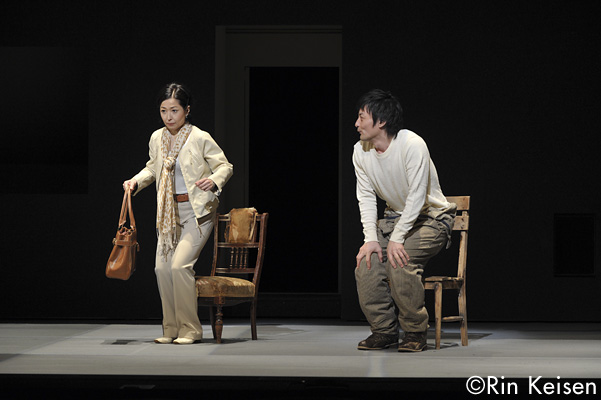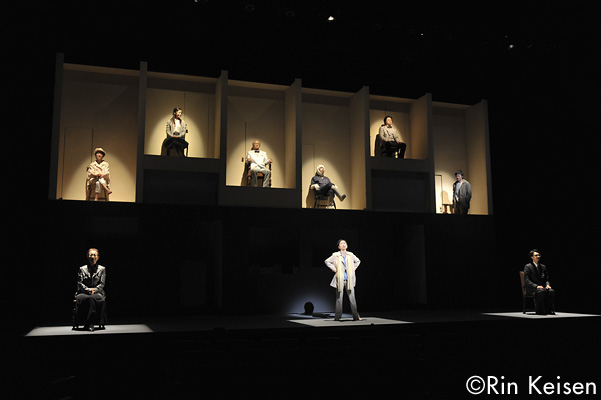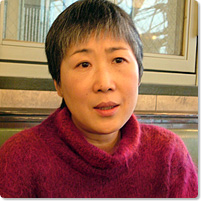The setting is a room in the offices of the Katari City Foundation for the Promotion of the Arts. Rinko Mutsueda, the president of a small agency who has been hired by the city as producer for its planned arts festival, has been called in for a meeting with the Foundation’s president, Kuri Amada, and executive director, Yorin Medaka. Also present is the director of the city’s Lifelong Learning Dept., Keisaku Numase. Before the coming organizing committee meeting for the festival, Amada wants to get opinions on her festival proposal. Rinko is full of praises for the revised proposal that has just arrived. But this proposal isn’t Amada’s. It is one written by Kunihito Irikawa, a creative artist who is serving as chairman of the organizing committee. It is called the Katari Chairs Project and calls for art works created by processing old chairs to be placed around the city and for producing a citizen-participation play titled “The Katari Stories” (
Katari-shi Gaiden
) that will be based on personal stories of Katari citizens. Amada voices her concerns about the safety and health risks involved in the chair project and the risk of personal information being exposed in the play. She then orders Rinko to convince Irikawa to withdraw the proposal.
City office staff Mitsuki Hojo leads Rinko to Irikawa’s studio. Hojo explains that she is the head of the local theater company and was going to be the writer for the citizen-participation play. She is clearly disappointed that the Irikawa proposal has been rejected. Irikawa’s studio is a storehouse lent to him on the goodwill of Eita Tanaka, the third-generation owner of an established Japanese wine (sake) shop and president of the Youth Group of the city’s Chamber of Commerce. When Rinko informs Irikawa that his plan will be rejected, he accepts the news with surprising calmness.
The day of the first Organizing Committee meeting has arrived. Two new faces are present in addition to the seven characters we have already met. They are Organizing Committee member and director of the Katari Municipal Museum of Art, Shogo Kugaya, and a lifestyle coordinator named Hizuru Toi. After making her introductory speech as Foundation president, Amada leaves the meeting. When Medaka makes a movement for the members to approve the existing festival plan, Eita stands up in opposition and begins handing out copies of Irikawa’s proposal. Eita also unveils a prototype of a Katari Chair that wins over Kugaya and Toi to support the Irikawa proposal.
With this unexpected development, Amada once again calls Rinko and her staff together. In the midst of the discussion to come up with a plan to thwart the movement to accept Irikawa’s plan, Rinko puts her position as producer on the line by suggesting to Amada that she meet with Irikawa once. After dismissing the others to speak with Mutsueda alone, Amada surprisingly agrees to her suggestion and asks Mutsueda to stay on in her position as producer and continue to be of assistance to her.
A month later, the timetable calls for the preparations for the festival to be well along, but in fact very little progress is being made. When Rinko ask Numase and Medaka for reports on their progress, all she gets is excuses. The Foundation has been delaying the processing of the necessary documents while preparing backroom measures to get the plans returned to president Amada’s original proposal. Their scheming is accidently revealed, however, when Amada sends an email intended for Numase and Medaka to Rinko’s address by mistake. Learning this, the Organizing Committee is determined to fight the Foundation president’s side, including holding a press conference to let the media know about their deception. Kugaya is chosen as the committee’s speaker in the negotiations with the Foundation. However, when he has dinner with Amada to discuss the situation, he falls for her tearful complaints and his attitude softens to the point where he agrees to accept a compromise plan with the Foundation side.
Fed up with president Amada’s methods, Rinko decided to talk with her directly. After delivering a list of Amada lies thus far, Rinko speaks from the heart, telling Amada that she doesn’t want to have to call a press conference and asking her to tell what is really on her mind. Amada seems humbled by these words, and Rinko believes that her appeal has been successful. However, the next move Amada takes is to use a two-pronged attach of buy-outs and threats to get Irikawa removed from the position of Organizing Committee chairman.
At the same time, Irikawa receives a call on his cell phone saying that his studio is on fire. What’s more, Numase is rescued from the scene by firemen while still carrying a can of kerosene. Unable to bear pressure from the Amada side, it appears that Numase tried to take things into his own hands. Both camps are now in a panic, but it is the Amada side that acts first to use some cleaver spin control by holding a press conference to skillfully manipulate public opinion and convince people that the whole incident has been caused by Irikawa’s side.
With this, the solidarity of the Organizing Committee side crumbles to the point where only Irikawa and Rinko remain. But, even they are quickly losing their courage and certainty. To make things worse make a new move combining pressure and conciliation by proposing that Rinko be named the new Organizing Committee chairperson.
Rinko is seriously unsettled by these developments. Amidst her confusion, the Organizing Committee meeting has begun, and one after the other, movements are passed to reinstate the original Amada proposal for the festival and to name Rinko the new chairperson of the committee. When Irikawa comes in, Rinko is no longer herself. She shouts out to him that in order to serve as a chairperson, one has to be humble, and getting along with the powers that be is an important responsibility of the job.
After the committee members leave, quiet returns to the room. The only two remaining there are Amada and Medaka. In that the proceedings that had taken place were merely a question and answer rehearsal for the real committee meeting scheduled for the following day.
The day of the committee meeting arrives. After the members that have been won over by Amada, Irikawa arrives. He has already assumed that the plan is to replace him as chairperson, and he says that he doesn’t plan to protest.
Before entering the meeting room, he says, “I have finally realized that the perpetrator is always a victim as well. The important thing is that you always question yourself, from the bottom of your heart. Eventually the festival will come and go. But even after it is over, our betrayals of ourselves will continue.”
Rinko watches him from behind as he enters the room. Amada and Medaka announce the start of the meeting. Slowly, Rinko begins to walk toward the room, but in front of her, two doors are waiting….




